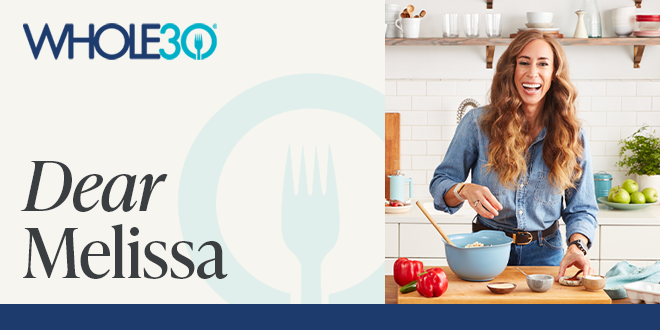“Hey Melissa—can I do the Whole30, but modify it?” —Love, so many people on Reddit
Dear Reddit (and everyone else),
I get some version of this modified Whole30 question just about every week. It sounds like this:
- “Can I do the Original Whole30 but keep eating beans, as I know they work well for me?”
- “Can I do the Plant-Based Whole30 but keep eating eggs for protein?”
- “Can I do the Original Whole30 but keep eating rice and oatmeal to support my running?”
You probably expect me to tell all of you, “No, because that’s not the Whole30.” But that’s not exactly how I’m going to answer! As with everything, there is some nuance, so let’s dive in.
Is this your first Whole30?
If this is your first Whole30, then YES, I’m going to say, “Complete the program exactly as written, with no modifications.”
Each Whole30 program (the Original Whole30, which includes animal products, and the Plant-Based Whole30, which does not) were carefully designed and approved by our medical advisory board to provide maximum benefit. Both programs eliminate as many commonly problematic food groups as is reasonable to keep the plan accessible. Each program also provides balanced macro- and micro-nutrition, and leaves participants with an impressive number of learnings following reintroduction.
Mixing and matching components of the program, like adding beans into your Original Whole30, eggs into your Plant-Based Whole30, or wine into either program, will impede the program’s efficacy. To put it plainly, to mix-and-match as your first Whole30 experience means you’ll still be giving up lots of foods you love for 30 days, but you probably won’t feel anywhere near as good as you could during those 30 days, and you certainly won’t learn as much as you could from the process. That feels like a losing proposition to me.
I’ll also add that if you’ve done the elimination portion of the Whole30 before, but have not completed a thorough, careful reintroduction, you haven’t really “done” the Whole30. Ouch, I know—but reintroduction is half of the program. Without it, you can’t effectively determine which foods were the most problematic for your system, and you won’t be able to answer “is it worth it?” in your food freedom. If this is your context, you fall into the camp of a “new Whole30’er,” too.
Summary: If this is your first Whole30 or if you’ve never completed a thorough reintroduction, follow either the Original or Plant-Based program exactly as written*, including reintroduction.
Now is the perfect time to start, in fact—our May Whole30 Community Cohort starts April 29, 2024, and will provide you with all of the support, accountability, and personalized guidance you need from planning and prep through elimination and reintroduction.
*Unless your healthcare practitioner recommends making changes to the program—doctor’s orders always supersede Whole30 program rules.
Are you a Whole30 alum?
If you’ve done the Whole30 before (elimination and reintroduction), learned a lot about how foods work in your unique body, and have been working your 3-part Food Freedom plan ever since, then your context is a little different.
When a Whole30 alum asks me, “I want to do another Original Whole30, but I’d like to keep beans and rice in my program,” my answer is, “Yes, I’m all for that! But that’s not you ‘doing a Whole30’—that’s you actively working your Food Freedom plan.” In fact, this is actually a recommended step in your Food Freedom plan, and is exactly how I describe food freedom in the book, Food Freedom Forever!
If you’ve done the Whole30 before, it’s natural to find that over time, your habits and how good you feel are starting to slip. Stress, a job change, a new baby, grief, a vacation, or a holiday can all throw a wrench in our eating and drinking habits. Rather than jump right back into a strict Whole30, however, I’d encourage you to take an interim step: Create your own set of guidelines based on your Whole30 results and your Food Freedom plan to help you return to feeling your best.
When this happens to me, it’s usually because I’ve been eating more potato chips, chocolate, and ice cream than usual, and snacking more after dinner. (When I combine these things, like ice cream late at night, I really feel it during that night’s sleep and the next morning.) For others, it may be the result of drinking more alcohol than usual; eating more bread, rice, and cereal than veggies; or leaning too heavily on pizza, fast food, and other take-out.
For this interim food freedom step, think about what parameters you could install based on your Whole30 learnings to return to feeling great without having to restrict everything the Whole30 eliminates. Do you need to eliminate the added sugar in your maple sausage, ketchup, or morning coffee? Would you fare just as well keeping white rice and oats in your daily diet, to support your activity levels? Could you still enjoy wine on the weekend, if you cut your weekday drinking and limited consumption to just one glass?
You might decide, “I’m going to return to the Whole30 principles of protein, veggies, fruit, and healthy fats at every meal, but I won’t sweat added sugar in condiments, and I’ll keep my morning protein shake and brown rice to support my athletic performance.” You might say, “I think giving up all alcohol for a few weeks is going to have the most impact, so I’m going to focus solely on that and see where that takes me.” Or maybe you’ll decide, “I’m going to limit DoorDash to once a week, and return to Whole30 meal planning every Sunday and Wednesday.”
No two peoples’ Food Freedom plan looks the same, so how you choose to work your Food Freedom plan to reset your habits and health is totally up to you. It’s still not a Whole30 (“modified” or otherwise), but it is the best strategy you could take to get back to feeling Whole30-good without needing to follow every tenet of the program.
As a bonus, it also reinforces the idea that food freedom is an active practice! By reframing this from a “modified Whole30” to “working my Food Freedom plan,” you’re giving yourself the self-confidence and sense of empowerment to trust your body and make changes based on what you know you need—not what the Whole30 program rules tell you to do. This will further reinforce your growth mindset, reminding you that you are a healthy person with healthy habits, and have the power and agency to make the choices that are right for you at any given moment.
Summary: Before you jump back into a strict Whole30, make adjustments to your Food Freedom plan in a way that works for your goals and lifestyle, and follow those self-directed guidelines for as long as it takes to get back to feeling Whole30-good.
The Whole30 is always here if you need it
Working to adjust your habits and food choices on your own without automatically rebounding to the strict rules of the Whole30 keeps you in your food freedom longer, and reinforces that you can trust your body. You may be surprised how easy and effective it is, now that you have your Whole30 learnings to guide you.
However, If you continue to struggle with your habits or if your modified Food Freedom plan doesn’t leave you feeling as good as you’d hoped, the Whole30 and all of its structure will always be there for you. You can always come back and do another Whole30 (by the books, including reintroduction) any time you want the structure, support, and proven framework of the program. With each Whole30, you’ll gain even more insight as to how food works in your unique body, solidify your healthy habits, and restore a deeper sense of connection and trust with food and your body.
And if you’re ready, our May Whole30 Community Cohort starts on Monday, April 29, 2024! Learn more about how our Cohort can provide the support, accountability, and personalized guidance you’ve been missing to find Whole30 success and lasting food freedom.
Disclaimer: This page contains affiliate links. We earn a small commission when you purchase through these links.
















